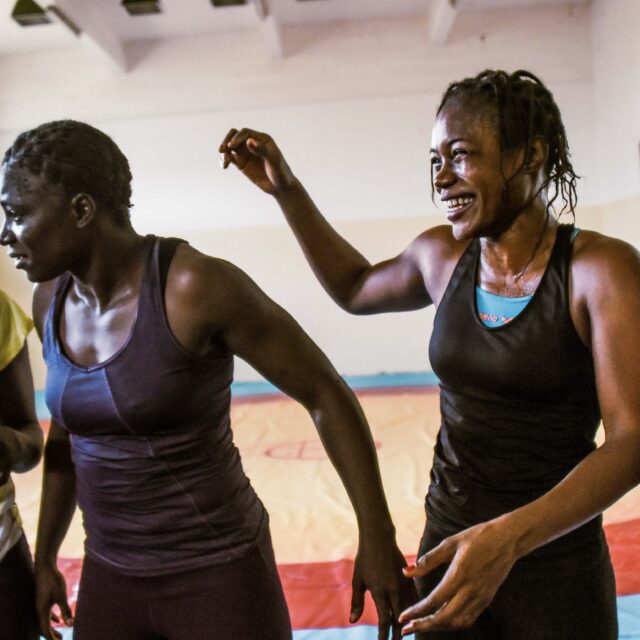With so much news on political infighting and royal departures, it’s easy to miss some crucial stories that highlight key global issues and show progress on Global Goals. So we’ve rounded up six underreported stories that you might have missed in January, including Gavi’s anniversary, the potential of Fitbits to track infectious disease outbreaks, and new efforts to tackle corruption.
Gavi, the Vaccine Alliance, turns 20
World leaders recently gathered for the World Economic Forum’s Annual Meeting in Davos, Switzerland. Among talk of climate change and economic speeches, a global health milestone was also celebrated. 20 years ago at Davos, Gavi, the Vaccine Alliance, was formed with a mission to “save lives, reduce poverty and protect the world against the threat of epidemics.”
In that time, Gavi has helped immunise 760 million children and has saved more than 13 million lives. Currently, it helps vaccinate almost half of the world’s children. This year, Gavi’s Third Replenishment will take place in London, where it hopes to raise at least US$7.4 billion. This would allow Gavi and its partners to vaccinate 300 million more children, save up to 8 million more lives, and continue investing in strengthening health systems.
Here’s more about how Gavi works and a breakdown of what you need to know about vaccines.
Highly anticipated US development finance agency opens
A new U.S. development finance agency opened its doors in January. The new agency, dedicated to channeling investments into low-income countries, was created with the passage of the BUILD Act in 2018. It will help direct private-sector dollars toward work in low-income countries, supporting things like building infrastructure, creating first-time access to electricity, supporting businesses and job creation and ultimately reducing the need for American foreign aid.
The highly anticipated opening of the agency is being “touted as the most significant change to the foreign aid ecosystem in the United States in more than 15 years,” according to Devex.
A look at the next decade in Africa
A new report from the Brookings Institution highlights the potential for economic growth across Africa over the next decade. It predicts that economic growth across Africa will continue to outperform other regions for the first half of the decade. Seven of the world’s 10 fastest-growing economies will be on the continent.
The report recommends top priorities for Africa over the next decade, including capitalizing on transformational technologies, focusing on job growth and strengthening regional cooperation.
Corruption in the spotlight, thanks to investigative reporting and new legislation
Isabel dos Santos, the daughter of the former president of Angola, is Africa’s richest woman with an estimated worth of at least US$2 billion. By her early 30s, she owned luxury apartments in London and Lisbon worth millions, and allegedly spent US$50,000 on curtains, US$9,200 on chaise lounges and nearly US$7,500 on gym equipment from Harrods.
She built a narrative as a self-made, determined woman who made her fortune through her businesses, and not through benefits from state funds. But recent investigative reporting has revealed she used secret accounts and her government connections to help amass her fortune. Angola is rich in oil and diamonds, but rampant corruption has contributed to widespread poverty and high infant mortality and illiteracy rates.
How exactly was she able to do this? Our explainer on anonymous shell companies has some insights into how she may have pulled it off. In the US, a new Senate bill is aiming to crack down on anonymous companies and prevent situations like this one.
Could Fitbits help identify infectious diseases?
A recent study from The Lancet wanted to see whether data generated using Fitbits — devices used to track fitness and activity — could help predict influenza-like illness and outbreaks within a population.
“Week-to-week changes in the proportion of Fitbit users with abnormal data were associated with week-to-week changes in [influenza-like illness] rates in most cases,” according to the study. Tracking these changes could improve real-time surveillance data and help public health responders act quickly when there’s a suspected outbreak.
But there are limitations. Other factors could lead to abnormal data, such as changes in physical activity, and the price for this device remains out of reach for many living in low-income countries.
Women-owned businesses out-perform, but still struggle to find equal funding
Women-owned companies perform better on average than companies run by men — but they often struggle to get the funding they need, reports the Thomson Reuters Foundation.
Companies founded by women only won 3% of venture capital funding in the U.S. in 2019, and a recent United Nations report found 80% of female-owned firms in emerging markets struggle to get credit. Combatting sexism by investing more in women huge economic potential: according to the Boston Consulting Group this investment could boost the global economy by up to $5 trillion.



